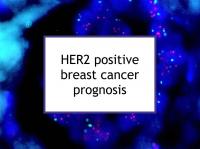Up to 20 percent of breast cancers overexpress the HER2/neu gene. HER2+ tumors can be either estrogen receptor negative (ER-) or ER+ (and also progesterone receptor negative (PR-) or PR+). HER2+ disease is associated with a significantly higher rate of local breast cancer recurrence as HER2- disease. Please also see HER2+ recurrence & survival data.
Therefore, breast cancer patients with HER2+ multifocal disease may not be good candidates for lumpectomy or other breast conserving surgery. Obesity appears to predict worse outcomes in HER2 positive (HER2+) patients. Women with ER+/PR+/HER2+ (triple positive) breast cancer tend to have more favorable outcomes than those with ER+/PR-/HER2+ or ER-/PR-/HER2+ disease.
The development of trastuzumab (Herceptin), which is used to treat HER2+ breast cancer, has markedly improved the prognosis of this type of breast cancer. HER2+ tumors have a greater tendency to metastasize first to the liver and lungs than other breast cancer subtypes.
Trastuzumab
Trastuzumab is a monoclonal antibody used to treat HER2-positive breast cancer. Trastuzumab binds selectively to the HER2 protein, thereby reducing cancer cell growth and proliferation. Trastuzumab has been shown to be effective in reducing breast cancer recurrence even among women with lower risk breast cancer (small, early stage, lymph node-negative disease). Trastuzumab normally is administered intravenously alone or in combination with chemotherapy. Use of trastuzumab can lead to heart damage, especially when used in conjunction with an doxorubicin chemotherapy regimen. Trastuzumab used in conjunction with nonanthracycline chemotherapy regimens has had some success to treat HER2+ breast cancer with fewer acute toxic effects and lower risk of cardiotoxicity. However, this combination has not been shown convincingly to be as effective as anthracycline-based regimens.
There are a few foods and spices that have been shown to amplify the effects of trastuzumab, thereby increasing its effectiveness. Please see our article on trastuzumab.
Inflammation and HER2+ prognosis
Systemic inflammation promotes breast cancer growth, invasion and metastasis. Inflammation, as measured by circulating C-reactive protein (CRP), has been found to reduce survival among breast cancer patients in general and HER2+ patients in particular. Inflammation may also contribute to resistance to trastuzumab.
High BMI and diabetes and HER2+ prognosis
Obesity is linked to worse outcomes in HER2+ patients. For example, one 2025 study reported that HER2+ patients who are initially overweight or obese (i.e., BMI ≥25 kg/m2) have worse outcomes than leaner women. A 2020 study also found that overweight or obese women with ER+/PR+/HER2+ disease were less likely to achieve pathologic complete response after neoadjuvant treatment. Chronic exposure to leptin, a hormone correlated with excess fat, increases HER2 stability. Leptin can impair response to trastuzumab in breast cancer cells. However, recent evidence suggests that treating with trastuzumab concurrently with chemotherapy may potentially equalize disease free survival rates between obese and normal weight women with HER2+ breast cancer.
Type 2 diabetes is a significant risk factor for developing breast cancer and breast cancer progresion. There is some evidence that the risk of HER2+ breast cancer is heightened by diabetes even in the absence of obesity. High circulating insulin levels increased both the tumor size and number of lung metastases in a mouse model of HER2+ breast cancer in one study. Use of metformin is associated with better prognosis among women with HER2+ breast cancer.
HER2 status changes
Several studies have reported that HER2 status can differ between a primary tumor and its lymph node metastases (known as discordance) and that the status can continue to change during disease progression. In other words, a woman with an HER2+ breast tumor can have HER2- lymph node metastases and vice versa. This happens in approximately 15% of cases. The possibility of discordance indicates a need to take biopsies and assess HER2 and hormone receptor status during disease progression in order to optimize treatment decisions.
One study found that HER2 expression can vary within an initial primary tumor and that this predicts shorter disease-free survival than consistent HER2 gene amplification. This appears to be more common when the biopsy results indicate low-grade HER2 amplification or questionable HER2 expression. Such findings indicate a need for HER2 testing on larger tumor samples for accurate assessment of HER2 status, according to the authors.
Sources of information in this webpage
The information above, which is updated continually as new research becomes available, has been developed based solely on the results of academic studies. Clicking on any of the underlined terms will take you to its tag or webpage, which contain more extensive information.
Below are links to 20 recent studies concerning this topic. For a more complete list of studies, please click on the tag HER2+. Please also see our articles on HER2+ recurrence & survival data, HER2+ disease (which describes this type of breast cancer) and breast cancer diet for HER2+ patients and survivors.
